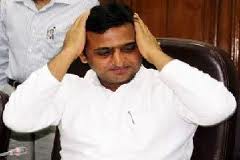
Lucknow, July 5: Having invited comparisons with Mayawati's profligate ways, a rattled UP chief minister Akhilesh Yadav on Wednesday reversed his decision to allow all legislators to purchase four-wheelers worth up to Rs 20 lakh by dipping into their local area development fund.
This is the second time in three weeks that Akhilesh has been forced to revoke his decision within 24 hours. Last month, he rescinded his order of shutting down malls and shops at 7pm to tackle the power crisis.
"I take back the decision. The reason for this is that most of the MLAs have decided not to take the offer after media criticism," a visibly upset Akhilesh said. "I felt that since MLAs have to move constantly, a vehicle will help them visit remote areas and monitor development effectively. But the media painted the decision as if it was against public interest," he said. The spirit of the decision, he added, was not understood.
An upset Akhilesh Yadav defended his "car fund" for legislators as meant only for those who could not afford one, but the chief minister's argument doesn't really wash.
According to analysis by an NGO, out of 403 MLAs in UP, 271 (67%) are crorepatis. There are only six MLAs who have declared assets less than Rs 5 lakh. Among the main parties, the average assets per candidate for SP is Rs 2.52 crore; for BSP it's Rs 4.44 crore; for BJP it's Rs 4.01 crore; and for Congress Rs 4.61 crore.
Akhilesh said many legislators had told him that they had vehicles that were seven to eight years old and were no longer suited to travelling large distances. It was after the media hype that MLAs refused to buy a car with the area development fund, he said.
But incongruously, after blaming the media, Akhilesh said the rollback should be seen as a sign of healthy democracy where due weightage is given to the "positive" suggestions by the opposition parties.
BSP's leader of opposition Swami Prasad Maurya welcomed the move but gave credit to the opposition for the rollback. He said the opposition pressure forced the government to revoke its decision to use MLA funds for buying personal cars.
"This and his earlier decision to shut malls at 7pm show that the CM is immature," he said, adding some ministers were the real force behind the decision.
BJP spokesman Vijay Bahadur Pathak said there was something wrong with Akhilesh's advisers. The Congress, however, was all praise.
Akhilesh Pratap Singh of Congress said, "By taking the decision back, the government has shown it has the courage to rectify a wrong as everyone said it would not send a good message."
Among main parties, the average assets per candidate for SP is Rs 2.52 crore; for BSP it's Rs 4.44 crore; for Congress Rs 4.61 crore, and for BJP it's Rs 4.01 crore.





Comments
Add new comment